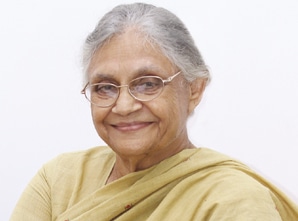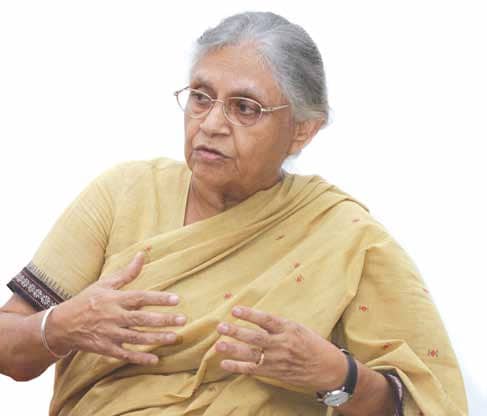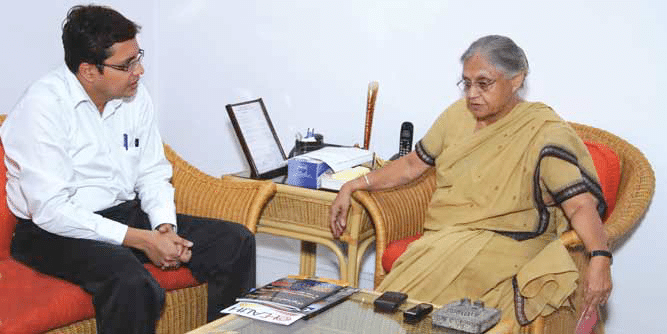
Sheila Dikshit, Chief Minister of Delhi, spoke to Dr Ravi Gupta, Manjushree Reddy and Rozelle Laha, on the major initiatives taken by the Delhi Government to enable children from every section of the society to gain access to quality education
 The Hon’ble Chief Minister of Delhi, Sheila Dikshit, received her primary education at Delhi’s convent of Jesus and Mary School and graduated from Miranda House, Delhi University and went on to obtain the post-graduation
The Hon’ble Chief Minister of Delhi, Sheila Dikshit, received her primary education at Delhi’s convent of Jesus and Mary School and graduated from Miranda House, Delhi University and went on to obtain the post-graduation
degree in history.
“Delhi Government is Funding the Deployment of ICT in Schools”
During the past few years many new initiatives have been taken by the government to bring about an improvement in the quality of education that is being offered in our institutions. Please tell us about the nature of the initiatives that have been taken by the Delhi government. Please also shed light on the way you see the actual impact of these initiatives.
We have taken several steps. The right to education has served as a big boost to the education. It is enabling many youngsters from financially weaker sections of society to access quality education. We have also made a study of why government schools are doing badly. The pass percentage of students is fairly low, even though we are spending reasonable sums of money on the education of every child. We have setup the Vidyalaya Kalyan Samiti (VKS), a School Welfare Committee, which caters to the needs of the children in the neighbourhood who are going to government run schools. The Committee ensures that the teachers are present in the classrooms and the students have access to quality reading material like textbooks, and that their uniforms are clean. The Committee also receives funds from the government to take care of minor renovations of the classroom infrastructure like repairing of windows, toilets etc. We are also having schemes for providing children with free uniforms, free books. There is also a scheme for providing scholarships to students of SC/ST background.
You midday meals scheme is also leading to many positive outcomes, please tell us about it?
The midday scheme is a great success as it has resulted in lot of poor students joining our schools. Midday meals are given to children up to a particular class after that they are not given. However, in a city like Delhi, the fact that our schools teach English and provide new avenues for the students to get good jobs, once they become adults, is the major force attracting students.
Tell us about the schemes that Delhi Government has started for girl children.
We found that the girl children were not coming to schools as often as the boys. The government of Delhi has launched the new scheme for protection of the girl child. It is called the ‘Delhi Ladli Scheme.’ The scheme aims to enhance the social status of girl child in the society as well as in the family, ensuring proper education to make the girls self-reliant, ensuringher economic security and protecting them from discrimination and deprivation. The Ladli scheme has resulted in lot of girls coming to the schools. We have also started the Kishori Shakti Yojna to encourage and facilitate personal hygiene and other qualities in girl children. The Yojna is now serving more than 7 lakh girls in the National Capital Region, and I am glad to say that the number of girl students in our schools is on the rise.
 Dr Ravi Gupta, Editor-in-Chief, digitalLEARNING magazine (L), in conversation with Sheila Dikshit (R)
Dr Ravi Gupta, Editor-in-Chief, digitalLEARNING magazine (L), in conversation with Sheila Dikshit (R)
Many children from poor families depend on the government run institutions for all their educational needs? What steps are you taking to bring about an improvement in the quality of education being offered in such institutions?
We have several monitoring mechanisms in place to ensure that the quality of education in our government aided or run institutions is up to the mark. It is not necessary that the poor students should depend only on the government schools. We have arrangements in place to ensure that even the best schools have to have certain number of children from poor families. The government is also giving aid to some schools to enable them to cater to the needs of poor children.
Can you enumerate the reasons due to which the ICT infrastructure in government schools is not quite up to the mark?
I agree that the infrastructure can be made much better. The Delhi government is funding the deployment of ICT in schools, but we are not able to achieve the best possible results as the teachers are not well trained. So we are now trying our best to educate the teachers in the usage of new technologies. We are working hard on this issue, and we are going to succeed in creating the best possible ICT infrastructure for our children. The Delhi government is also trying to rope in private companies through PPP models for the installation of ICT in our institutions.
It is a good thing that the number of students in our schools has gone up. However, after passing 12th, the same students start aspiring for higher education. But the country continues to face a great crunch of higher education seats. How are you planning to solve this problem? Also when it comes to teaching vocation skills to the students, what is your strategy?
The government is focused on enabling many more higher education institutions to come up. It is also true that not every student wants to go to the university. Many of them want to do courses like Hotel Management, Tailoring, Electrician training, and much else, so vocational education is also the need of the hour. We already have lot of universities and vocational training centres in the city, but they are clearly not proving to be enough, because as you have said in the question, the demand for quality education is rising all the time.
Many States like Rajasthan, Uttar Pradesh and Madhya Pradesh have opened their gates for private universities. Is there any strategy for doing the same?
We are definitely trying to encourage private investments in education. We already have Amity University. Lot of private schools are also there. The Delhi Government is totally dedicated to fulfilling the educational needs of all the boys and girls who live in the national capital region. If private investments can lead to the creation of quality institutions for learning, then such institutions have to be encouraged. Our major agenda is to reform the system of education so that our students are able to reap the full benefits of latest technologies, courses and teaching techniques.






















